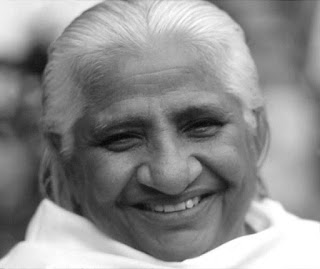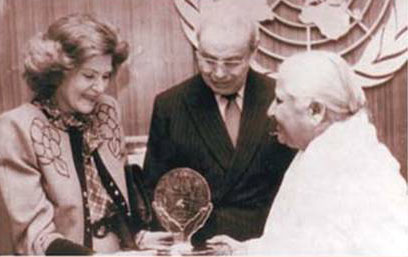Filtered By: Lifestyle
Lifestyle
Remembering Dadi Prakashmani, a woman of spirit
BY RINA ANGELA CORPUS
Part of a series on women this month. March is Women’s Role in History Month in the Philippines.
With a mind saturated from decades of academic study and jaded by political activism, I yearned for the simplest way to make sense of life. Somehow, amid the composite pathways I took in my young adult life, I knew that a spiritual path would provide the ultimate answers to my questions.
I was 23 when I first stepped into a meditation center that helped me sort out not just my path, but my way of thinking and being in the world. I was taught and guided by meditation teachers, mostly women, to whom I remain thankful to this day. After more than a decade of meditation practice, they’ve become my most trusted peers and friends.
I consider it even more significant to have experienced the presence of one soul whose life filled me with what it means to live with meaning and purpose.
In speaking of my life’s greatest influence, l hold the memory of Dadi Prakashmani, a meditation teacher and a wise soul who surrendered her life to a spiritual path at the tender age of 15.
Vocation
 Female spiritual leaders were unheard of in India in the 1930s, yet Dadi ("elder sister" in Hindi) dedicated her life to serving in Om Mandali, a then-little-known meditation school in Karachi (now in Pakistan). It is now Brahma Kumaris, an international NGO with consultative status with the United Nations. The institution runs centers in 130 countries, teaching free meditation and values courses in local communities. The school’s growth happened under Dadi’s dynamic leadership from 1969 until her death in 2007.
Female spiritual leaders were unheard of in India in the 1930s, yet Dadi ("elder sister" in Hindi) dedicated her life to serving in Om Mandali, a then-little-known meditation school in Karachi (now in Pakistan). It is now Brahma Kumaris, an international NGO with consultative status with the United Nations. The institution runs centers in 130 countries, teaching free meditation and values courses in local communities. The school’s growth happened under Dadi’s dynamic leadership from 1969 until her death in 2007.
It’s now seven years after Dadi’s demise. I remember little of the words she spoke, for it was her very being that illumined my life. Dadi moved, walked, ate and studied with everyone else in the meditation school, as if she were just like any other student. Her ego-less, carefree, self-effacing manner continue to be the qualities that I strive to nurture in myself amid a busy modern life, seemingly dictated by the nanosecond.
Prakshmani means “jewel of light,” and my meeting Dadi for the first time in Mt. Abu, Rajasthan, in 2001 was filled with lightness, calm and comfort. Dadi exuded warmth and a feeling of belonging—the same traits, I would realize, that she showed to everyone. It was her emotional equipoise, a result no doubt of seven decades of meditation practice, that made her shine like a polished gem, inside and out. Grounded, cheerful, carefree, Dadi could be seen in the courtyard in the early morning, sitting in a chair to get some sunshine as students passed her by.
On one such morning, my friend and I playfully decided to ask for a photo with her, to which she readily agreed. Dadi seemed like an innocent child and playmate, game to accommodate and fulfill anyone’s requests.
And while there were teachers who taught me of the basic principles of meditation practice, it was Dadi who showed me the subtler aspects of living a life of virtue, sans preachiness. Dadi’s classes were never formal and lengthy, but punctuated with a few lines. One that I will always remember was Dadi’s motto: “Take happiness, give happiness. Take peace, give peace. Take love, give love.”
 Samosas and ice cream
Samosas and ice cream
After sharing her short snippets of wisdom, Dadi would then ask us how we were doing, what we wanted to eat for lunch, and if we wanted a picnic in the park. Samosas, ice cream, fries, the group would usually reply back, and sure enough these would be part of our meals the following day. Plus, the picnic would have been arranged.
Care, I realized, was not a customary incidental in a spiritual path, but is at the very heart of one’s ability to look after oneself and others as in a family. I was shown that spirituality also meant cascading one’s virtues to practically nurture everyone’s needs in a community. To me, being able to look after others is a sign that one has deeply cared for the self, with an unwavering attention to one’s capacity to give what was essential to nurture others.
Dadi’s presence always reminded me of the power of the mother, the power of guiding hearts quietly to a place of peace inside themselves, because she guided herself to reach it. Always in a white sari, she was an embodiment of simplicity, who owned nothing yet gave everything of herself back to the service of humanity. Like a child and a master, her eyes sparkled with a deep contentment and respect, regardless of who she was in front of. These, to me, are the marks of a servant leader: a way of being without force, a gentle yet firm embodying of inner strength, of generous love balanced with non-attachment. Dadi embodied the feminine principle that is much-needed to heal hearts that have grown weary from our competitive patriarchal world.
Accessible and modest, one would never know that Dadi served as one of the presidents of the Parliament of the World’s Religions, or that she was once a recipient of a United Nations Peace Medal, not to mention the honorary doctorates she received from a number of universities. She never finished formal education, yet her humility and trustworthiness made her emerge most fit to lead an institution that runs 8,000 centers, with close to a million students worldwide.
I continue to celebrate the human virtues that Dadi chose to live by. My memory of her as a gentle yet steady spiritual mother keeps me spirited and awake to the presence of beauty and the great potential that lies in every human soul. — BM, GMA News
With a mind saturated from decades of academic study and jaded by political activism, I yearned for the simplest way to make sense of life. Somehow, amid the composite pathways I took in my young adult life, I knew that a spiritual path would provide the ultimate answers to my questions.
I was 23 when I first stepped into a meditation center that helped me sort out not just my path, but my way of thinking and being in the world. I was taught and guided by meditation teachers, mostly women, to whom I remain thankful to this day. After more than a decade of meditation practice, they’ve become my most trusted peers and friends.
I consider it even more significant to have experienced the presence of one soul whose life filled me with what it means to live with meaning and purpose.
In speaking of my life’s greatest influence, l hold the memory of Dadi Prakashmani, a meditation teacher and a wise soul who surrendered her life to a spiritual path at the tender age of 15.
Vocation

The author's mentor, Dadi Prakashmani. File photos from the Brahma Kumaris
It’s now seven years after Dadi’s demise. I remember little of the words she spoke, for it was her very being that illumined my life. Dadi moved, walked, ate and studied with everyone else in the meditation school, as if she were just like any other student. Her ego-less, carefree, self-effacing manner continue to be the qualities that I strive to nurture in myself amid a busy modern life, seemingly dictated by the nanosecond.
Prakshmani means “jewel of light,” and my meeting Dadi for the first time in Mt. Abu, Rajasthan, in 2001 was filled with lightness, calm and comfort. Dadi exuded warmth and a feeling of belonging—the same traits, I would realize, that she showed to everyone. It was her emotional equipoise, a result no doubt of seven decades of meditation practice, that made her shine like a polished gem, inside and out. Grounded, cheerful, carefree, Dadi could be seen in the courtyard in the early morning, sitting in a chair to get some sunshine as students passed her by.
On one such morning, my friend and I playfully decided to ask for a photo with her, to which she readily agreed. Dadi seemed like an innocent child and playmate, game to accommodate and fulfill anyone’s requests.
And while there were teachers who taught me of the basic principles of meditation practice, it was Dadi who showed me the subtler aspects of living a life of virtue, sans preachiness. Dadi’s classes were never formal and lengthy, but punctuated with a few lines. One that I will always remember was Dadi’s motto: “Take happiness, give happiness. Take peace, give peace. Take love, give love.”

Dadi Prakashmani receiving the United Nations' Peace Messenger Award from the UN Secretary General Javier Perez de Cuellar in 1987.
After sharing her short snippets of wisdom, Dadi would then ask us how we were doing, what we wanted to eat for lunch, and if we wanted a picnic in the park. Samosas, ice cream, fries, the group would usually reply back, and sure enough these would be part of our meals the following day. Plus, the picnic would have been arranged.
Care, I realized, was not a customary incidental in a spiritual path, but is at the very heart of one’s ability to look after oneself and others as in a family. I was shown that spirituality also meant cascading one’s virtues to practically nurture everyone’s needs in a community. To me, being able to look after others is a sign that one has deeply cared for the self, with an unwavering attention to one’s capacity to give what was essential to nurture others.
Dadi’s presence always reminded me of the power of the mother, the power of guiding hearts quietly to a place of peace inside themselves, because she guided herself to reach it. Always in a white sari, she was an embodiment of simplicity, who owned nothing yet gave everything of herself back to the service of humanity. Like a child and a master, her eyes sparkled with a deep contentment and respect, regardless of who she was in front of. These, to me, are the marks of a servant leader: a way of being without force, a gentle yet firm embodying of inner strength, of generous love balanced with non-attachment. Dadi embodied the feminine principle that is much-needed to heal hearts that have grown weary from our competitive patriarchal world.
Accessible and modest, one would never know that Dadi served as one of the presidents of the Parliament of the World’s Religions, or that she was once a recipient of a United Nations Peace Medal, not to mention the honorary doctorates she received from a number of universities. She never finished formal education, yet her humility and trustworthiness made her emerge most fit to lead an institution that runs 8,000 centers, with close to a million students worldwide.
I continue to celebrate the human virtues that Dadi chose to live by. My memory of her as a gentle yet steady spiritual mother keeps me spirited and awake to the presence of beauty and the great potential that lies in every human soul. — BM, GMA News
More Videos
Most Popular



